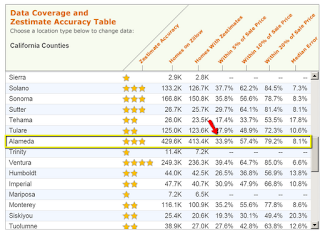Real estate is no exception. You can go online and find infinite information. Some of it very useful. Some of it as tangible as pixie dust. A good real estate agent can help guide you to the most reputable sites and tell you what sources are flawed. In the East Bay, agents with access to our local Multiple Listing Service (MLS) have a product called ListingBook, which allows them to share accurate MLS data with their clients. This tool is by invitation only, so you do need an agent to hook you up.
If you are not yet aligned with a Realtor, and you want to filter out inaccurate information, it's important to understand why online data is not always reliable. To do this, consider how real estate data is sourced and commoditized online-- and see yourself (homeowner, potential buyer or enthusiast) as the consumer of this commodity.
The first rule of reporting is "question the source." Some sites gather information from their user community. This is the Wiki model and requires the community to self-police its users. Wonderful concept; but not always reliable, and often it is difficult to trace the source. These sites can have inaccuracies due to human error or dishonesty.
In addition to requesting user participation, some sites employ complicated algorithms to automate the population of data. The algorithms pull from a variety of sources including MLS data and county records-- sometimes resulting in surprisingly accurate calculations. Other times, due to small sample sizes or the inability to account for individual variations (like the spectrum of remodeling choices evident in our Bay Area homes), the results are misguided. The graph below is Zillow's disclosure on the accuracy of their data. Click on the graph to enlarge it.
Chart "About Zestimates" from Zillow.com 1/20/12
Careful users should also consider how a site is monetized. Many sites rely on on advertising dollars to keep the site free to the user. To lure advertisers, they hope to show good search engine ranking on sites like Google and Yahoo. To this end, some sites post real estate data indiscriminately in order to gain good SEO (search engine optimization). Having lots of data offers more keyword search opportunities and better ranking. Better ranking translates to more paid ads. More is better here, so attention is not always given to fixing inaccuracies.
The foreclosure website ReatlyTrac suffers from the "more is better" syndrome. In the quest to have the most foreclosure listings possible, they post "pre-foreclosure" information. If a homeowner is behind in payments, their home could make this list. Many of these homes never become bank-owned foreclosures: The homeowner catches up on payments or sells the home before they get a notice of default. These phantom listings can be confusing to a home buyer.
Real estate agents also use online sites to monetize their efforts, if indirectly, to gain a commission. They do this by aligning their marketing prowess with the sites that have the best ranking: “Dear Seller, I am so good I promise to post your home on Zillow and Trulia and Realtor.com….” This creates inaccuracies because, although many agents are eager to put their listing online and gain the exposure, there is far less motivation to update the information after the property has gone pending or sold. We get frequent emails asking about random listings found online, only to discover they have long since sold. BTW, Berkeley Hills Realty prides itself on tracking our syndication efforts and we take the extra step to revisit the sites we have control over to post the most accurate data.
This article is not meant to render the mentioned websites disreputable. We use all of the above sites daily in our business and appreciate the multiple streams of information. No one wants to limit access to online data. But, in the age of information overload, good advice is priceless. Real estate agents have become the curators of good content. Contact one of our agents for guidance to the best available information.

No comments:
Post a Comment